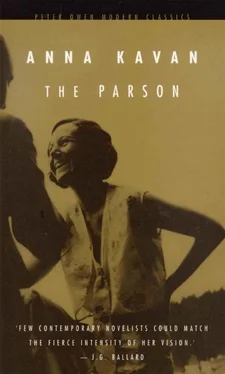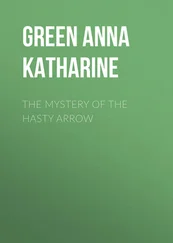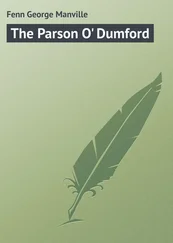Anna Kavan - The Parson
Здесь есть возможность читать онлайн «Anna Kavan - The Parson» весь текст электронной книги совершенно бесплатно (целиком полную версию без сокращений). В некоторых случаях можно слушать аудио, скачать через торрент в формате fb2 и присутствует краткое содержание. Год выпуска: 2001, Издательство: Peter Owen Publishers, Жанр: Современная проза, на английском языке. Описание произведения, (предисловие) а так же отзывы посетителей доступны на портале библиотеки ЛибКат.
- Название:The Parson
- Автор:
- Издательство:Peter Owen Publishers
- Жанр:
- Год:2001
- ISBN:нет данных
- Рейтинг книги:4 / 5. Голосов: 1
-
Избранное:Добавить в избранное
- Отзывы:
-
Ваша оценка:
- 80
- 1
- 2
- 3
- 4
- 5
The Parson: краткое содержание, описание и аннотация
Предлагаем к чтению аннотацию, описание, краткое содержание или предисловие (зависит от того, что написал сам автор книги «The Parson»). Если вы не нашли необходимую информацию о книге — напишите в комментариях, мы постараемся отыскать её.
Ice
The Parson
The Parson
The Parson — читать онлайн бесплатно полную книгу (весь текст) целиком
Ниже представлен текст книги, разбитый по страницам. Система сохранения места последней прочитанной страницы, позволяет с удобством читать онлайн бесплатно книгу «The Parson», без необходимости каждый раз заново искать на чём Вы остановились. Поставьте закладку, и сможете в любой момент перейти на страницу, на которой закончили чтение.
Интервал:
Закладка:
He felt quite alone in the crowded bar, where there were too many smiling faces, as there had been too many flowers. He was so close to her that his hand touched her dress. But the Rejane he knew and loved had already left him. A stranger seemed to inhabit her flawless beauty.
He willed her desperately to come back, staring fixedly at her with spellbound eyes. But she kept her head turned away, talking to the steward behind the bar, and refused to look at him. It was her voice he heard. But she was not speaking. She had left him and gone away.
Yet those were her hands; the hands that had lately picked berries and mushrooms with him, held the reins, patted the pony’s neck, fed it with lumps of sugar. It seemed incredible now that they should have done these things. With a certain horror he watched them, flashing with many rings, darting in alien, airy gestures. They were hers — and they were not hers. He had a sensation of nightmare.
She was not coming back to him. Now he had to know it. She had gone too far away. He had lost her — this was the end. Out of the darkness rushing in on all sides, struggling to hold it off, despairingly, he spoke her name, ‘Rejane’, pleading with her for his life.
She glanced at him then with faint artificial surprise, as if she hadn’t expected him still to be there. For the last few minutes she had, in fact, been waiting more and more impatiently for him to go. Why couldn’t he see that he wasn’t wanted and take himself off?
She looked again, and with indignation, at the fine, soldierly man whose glittering eyes were all the time fixed on her in an Ancient Mariner stare. He was a weight upon her. She longed to be relieved of the burden of his presence, which, though she didn’t know it, represented the cruel and frightening north, of which she’d so nearly become the victim. She had thrust the terrifying experience out of her thoughts. But she couldn’t relax fully, she couldn’t be reabsorbed into her own world, while he was there, as its symbol. She wouldn’t feel really safe from the power of the north until she’d got rid of him.
She told herself she could stand no more of his silent gloom. Yesterday, circumstances had forced her to endure it — how dare he try to inflict it on her today as well! She wasn’t going to put up with it any longer. He had absolutely no right to be here in her world. He was only a ghost, a shadow, a relic of her finished interlude. Let him go back to the north, where he belonged.
‘Don’t wait,’ she told him brightly, with her malevolent little smile. ‘I like my goodbyes short and sweet.’ Relieved because she’d dismissed him at last, to make sure there was no misunderstanding, she held out her hand.
*
The man’s heart beat once in a heavy down-stroke, then seemed to stop beating. Everything seemed to stop. It grew dark, as if the lights had gone out.
Then, with an emerald flash, as from an evil green eye, her hand, sparkling with rings, came towards him. And, to his surprise, he saw his surroundings unchanged, the lights still shining brightly, the people laughing and talking. Only he was cut off from them now as by the glass wall of an aquarium. They had the remoteness and the slight distortion of things seen through thick glass.
They didn’t concern him. But, with a distant anxiety, he watched the hand coming towards him, knowing he wouldn’t be able to take it, but not knowing what to do. All contact was ended for him, he could not now bear to touch anyone. He had left all that. He felt a slight horror of the approaching hand: it was coming too close — no one must touch him now.
Suddenly, at the last moment, as if obeying an order only he could hear, he lifted his own hand sharply in a formal salute, bringing his heels together, the other hand stiff at his side; directly afterwards swinging round to make his way out of the room, oblivious of the curious faces that turned to watch him.
People stared, following him with their eyes, but he didn’t notice. He had no more to do with them. He had left their bright world, which claimed reality through the illusion of daylight. His love, too, had been an illusion, and he left it behind him with all the rest. All he wanted now was to be quiet.
The lights were too bright here, there were too many people, and they made too much noise. He had to be alone somewhere, undisturbed.
8
TAKING no notice of anyone, Oswald left the ship, leaving his life behind there, as he might have left a dropped glove, and, knowing nothing about it, returned to the station and got into the waiting train. Alone like a dreamer, neither feeling nor thinking anything, he sat in the cold, empty carriage, staring straight in front of him. When bells rang presently and there was the low, lugubrious hoot of a siren, these noises meant nothing to him, had no associations.
Then people began to trickle, to pour into the station, talking cheerfully, walking briskly in the cold air, entering and filling the train. The sight of them roused him a little, making him aware again of being cut off and alone, separated from everyone else. All these others were in the big bright unreal place he’d left. He could not possibly communicate with them, or have anything to do with them.
Nevertheless he wished they would go away. Their presence caused him a distant uneasiness. He didn’t look at them, but, with a faint shadowing of anxiety, simply sat waiting till they should have gone. And, though the train was full, nobody came to sit near him.
People looked into his compartment and then hurried on, frightened off by some emanation of loneliness enclosing him like a capsule — the loneliness of one who has gone beyond time and reality — which made them nervous, without knowing why, so that they kept away.
The train started. Sitting quite still and passive, unthinking, Oswald let it carry him back to the small town where he had left the car, got out here, and went into the streets.
It was lunch-time, there were few people about. Those he saw were like dream people, utterly disconnected from him. Yet it was he who felt shadowy beside them — they were solid with life. He vaguely wondered if they could see him, feeling he passed like a shadow, outside their world, and alone. Where was he? What had happened to him? He’d never been like this before. But he was getting used to it and didn’t mind. He thought no more about his feelings, or about anything. His consciousness seemed to have left him and gone on somewhere else.
His body, however, continued in its old way, from force of habit. Coming to a restaurant that was almost empty, it went in, ordered and ate a meal, drank some whisky, his real self remaining the whole time aloof. Such things as eating and drinking no longer concerned him, unconcerned as he was with life. But his healthy young body acted out of its own impulse, and, in the same mechanical fashion, began to drive home.
He was like a zombie, a body only, moving about the world, its inner essence already gone. The small part of his brain that still functioned normally was occupied with driving the car. He knew nothing about it when, at a certain crossroads, he swung the wheel right over and drove in a different direction, away from the place where he lived.
*
Now he was on a narrow, neglected by-road, unmarked except on large-scale ordinance maps, and used only by a few adventurous campers and rock climbers, even in summer. Here he passed neither traffic nor houses, driving through country always wilder and more desolate, more given over to water; until he reached a region where the land was reduced to a handful of skeleton fingers pointing between the lochs, treeless, without vegetation of any sort, bare bones of rock reaching out into the blackish water.
On one of these narrow spines running out into the ultimate desolation of sea and rock, he drove for some time, with a certain fixity of the unconscious will, as to an appointment he had to keep at a given hour, glancing occasionally at his watch, although he’d ceased to register time long ago.
Читать дальшеИнтервал:
Закладка:
Похожие книги на «The Parson»
Представляем Вашему вниманию похожие книги на «The Parson» списком для выбора. Мы отобрали схожую по названию и смыслу литературу в надежде предоставить читателям больше вариантов отыскать новые, интересные, ещё непрочитанные произведения.
Обсуждение, отзывы о книге «The Parson» и просто собственные мнения читателей. Оставьте ваши комментарии, напишите, что Вы думаете о произведении, его смысле или главных героях. Укажите что конкретно понравилось, а что нет, и почему Вы так считаете.












